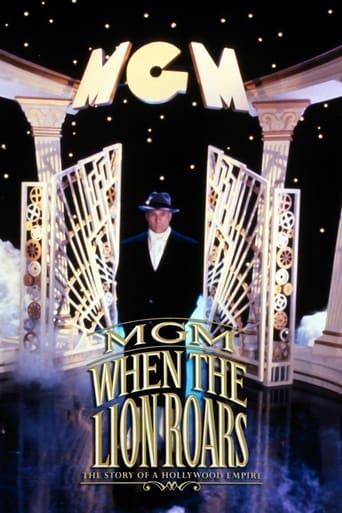Lawson
This is an excellent documentary for anyone interested in Golden Age Hollywood. It chronicles the rise and fall of MGM, once the biggest studio thanks to its famous and infamous executives, Louis B. Mayer and Irving Thalberg. The mini-series is 6 hours long and full of rare photos, scenes from better and lesser known movies, as well as interviews with stars - many now deceased - about their experiences as part of the studio's stable of cast and crew. Most of the more famous actors get at least a short segment, though if they have an interesting story, they get more screen time - e.g. with Greta Garbo, Judy Garland, Jean Harlow. For a movie buff like me, the docu contained a lot of information I already knew (and just as much I didn't), but even then, I had mostly read my knowledge till then and it was great getting the information again with accompanying sights and sounds. It also led me to greater appreciation of various actors, foremost of which is Judy Garland. I haven't seen many of her movies and so I hadn't heard her sing many of her signature songs beyond Over the Rainbow. Wow, can that girl sing and dance. No wonder she's such a gay icon. It struck me a bit too late that I should start taking down with pen and paper all the movies that I now want to watch - there are puhlenty - so I guess I'll have to watch all 6 hours again at some point, lol.
blanche-2
"MGM: When the Lion Roars" is a 1992 documentary hosted by Patrick Stewart. Shown in three parts on Turner Classic Movies, it tells the story of the monolithic studio from its beginnings, taking us through the influence of the great Irving Thalberg, after his death, during World War II, after the war, the growth of television, and MGM's eventual demise.All of the studios had a particular look to their films and a strong point of view. MGM was known for its huge array of stars, its opulence, its classy musicals, and its family entertainment, especially under the aegis of Louis B. Mayer. Even its "B" movies, such as Dr. Kildare, had "A" movie quality.The studio's main problem was its lack of foresight and lack of awareness that the audience changed over time. The belief was that television was a fad, for instance - major error. And all the studios suffered when the courts broke up studio ownership of the movie theaters.The documentary is highly entertaining, filled with interviews, scenes, and musical numbers. Stewart voices the incorrect information that Jean Harlow died because her mother's religion didn't allow her to have treatment. Jean Harlow died of kidney disease, for which there was no cure, no transplant, no dialysis. She had plenty of medical attention, but there was nothing anyone could do once she developed the disease.Very enjoyable and well worth seeing.
didi-5
Patrick Stewart's irritating introduction aside, this lengthy multi-parter traces the history of MGM from their earliest silents (He Who Gets Slapped, The Student Prince of Heidelberg, Ben-Hur, The Big Parade), through the golden era (Gable, Harlow, Hepburn and Tracy, Astaire and Kelly, Garland, Garson, etc etc), to the fifties television boom and MGM's attempts to adapt, and on to the demise of the studio as a production force in the 1970s and growth as a hotel chain. The clips are numerous, and of the highest class, although some of the silents look slightly speeded up (my copy of The Big Parade doesn't move as quick as that!) - they are well-chosen, and representative of each era. Better still are the interviewees, Helen Hayes and Maureen O'Sullivan remember Irving Thalberg, Margaret Booth talks of her experience of editing movies from the early days onwards, Van Johnson remembers war film experiences, Mickey Rooney remembers Judy Garland, Luise Rainer and June Allyson recall Louis B Mayer, Freddie Bartholomew and Jackie Cooper talk of being child stars, and on and on.This series is a treasure and if it doesn't make you want to explore 'the oldies', I don't know what will. Brilliant.
Brundledan
The meteoric rise (and lamentable fall) of, perhaps, the most legendary Hollywood movie studio is documented here, in a dazzling three-part mini-series as lavishly designed as the best of the MGM films themselves. Pure gold for movie buffs (and as easily accessible to the average viewer); "When the Lion Roars" combines a grippingly-told account of MGM's history, rich with tons of vintage film clips, interviews with studio stars, and a fascinating look at such legendary figures as L.B. Mayer and Irving Thalberg - all ably hosted by Patrick Stewart, who is clearly enjoying himself throughout.And well he should be. There are scores of documentaries out there about Hollywood's Golden Age, but none even REMOTELY approaching the quality and craftsmanship of "When the Lion Roars". This is quite possibly one of the finest documentaries ever made. It has been released on video and, though not the easiest thing to find after seven years, is well worth the search.

